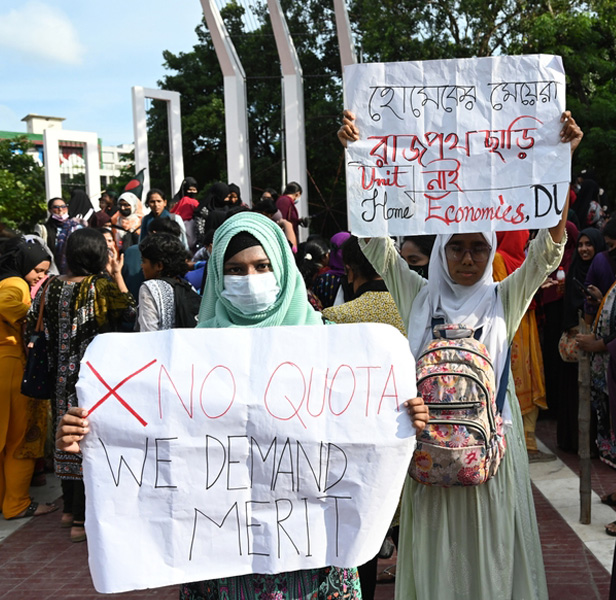CANADIAN NEWS September 05, 2024
Gildan Reopens Bangladesh Facilities Following More Worker Unrest
Laborers in the country’s garment sector have been protesting, making specific requests for things like guaranteed employment and more clarity over promotion criteria.
Counselor Top 40 supplier Gildan’s (asi/56842) factories in Bangladesh temporarily closed down in early September as workers in the garment facilities joined in another round of laborer protests, which have been affecting the nation since July.
For sure, Gildan wasn’t the only company impacted. This past week, the Daily Sun reported that authorities in the Dhaka subdistricts of Savar and Gazipur shut down at least 35 garment and pharmaceutical factories as workers staged demonstrations asking for job permanency and salary increases.
Workers protesting in Bangladesh over the summer.
At the time of Daily Sun’s publication on September 3, Gildan had issued an indefinite closure of its Bangladesh factories, citing “recent untoward and unexpected events,” but the company told ASI Media that it has since reopened.
Genevieve Gosselin, director of global communications and corporate marketing at Gildan, confirmed via email that the facilities had temporarily closed “to ensure employees’ safety and the respect of government-imposed curfews.” She also specified that the demonstrations were not solely targeted at Gildan but rather the country’s ready-made garment sector overall, resulting in factories like Gildan dealing with the fallout.
This Promo Insiders podcast discusses supply chain threats facing the promo industry on the eve of the holiday gifting season, including the challenges in Bangladesh.
“Gildan respects employees’ rights to freedom of speech and is committed to listening and finding practical solutions to their concerns and requests as part of its normal course of business,” Gosselin said. “Finally, it is important to note that Gildan has already resumed operations in the country.”
According to reports, employees at Gildan’s Bangladesh facilities presented the company with an 11-point list of demands, including a guarantee of at least 10 years of employment for current employees, increase in attendance bonus from 300 Taka ($2.51 USD) to 800 Taka ($6.70), a guarantee that all employees involved in the protests would not be fired and promotion criteria relating to appropriate qualifications.
“Gildan respects employees’ rights to freedom of speech and is committed to listening and finding practical solutions to their concerns and requests.” Genevieve Gosselin, Gildan (asi/56842)
Workers in Bangladesh have been protesting over the quota system for government jobs. There have been arrests, clashes between protestors and police, manufacturing interruptions and hundreds of deaths as police instituted a “shoot-on-site” curfew in the capital city of Dhaka.
The Daily Sun reported that demonstrators blocked major roadways, causing traffic delays until police and army personnel arrived to disperse the crowds.
Some business leaders in Bangladesh have called certain of the workers’ demands “irrational,” such as demands for wage increases.
Mohammad Hatem, president of the Bangladesh Knitwear Manufacturers and Exporters Association, told the Dhaka Tribune that current laws make it difficult or impossible to meet demands.
“They demand a 25% (increase), while it is 5% as per Labor Law,” he said. “We cannot go beyond the laws. Their demands regarding attendance bonus and men-women ratio are also illogical.”
Meanwhile, the president of the Bangladesh Garment Manufacturers and Exporters Association, Khandaker Rafiqul Islam, has said that the BGMEA is committed to addressing labor discontent.
Gildan, specifically, did not go into detail about what changes allowed for the reopening of its facilities or what it plans to do to address worker demands in the future.

